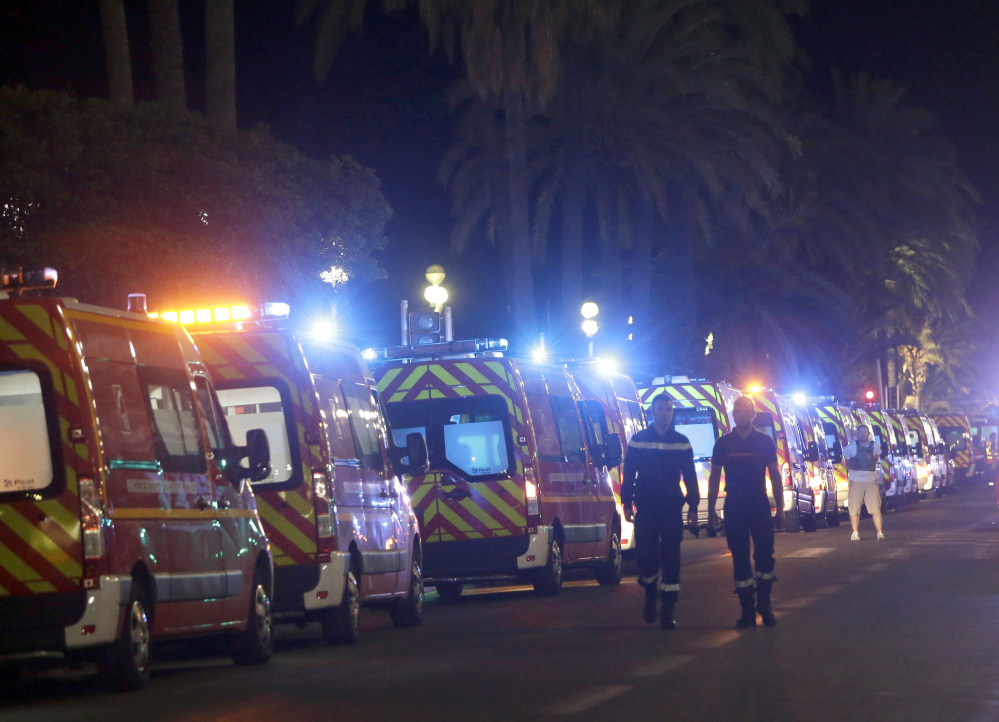It would be difficult to pick a more evocative place of celebration than the Promenade des Anglais in Nice, a boulevard lined with palm trees and flanked by broad sidewalks, arcing gently around the pebble beach that on Thursday night was packed with people watching the Bastille Day fireworks reflected over the water.
The street is lined with the grand hotels – the Palace of the Mediterranean and the Royal – and apartment buildings constructed decades ago. It abuts the old city, where on weekends there are crowded open-air markets and pedestrians wandering along crooked streets.
It also would be difficult to pick a more meaningful time to attack France, as an assailant did Thursday night, killing dozens of people. Targeting this city on Bastille Day is like attacking a scenic city in the United States on the Fourth of July. Bastille Day, full of flags and fireworks, is France’s independence day, a day about revolution and the casting off of the yoke of the king.
As police and troops counted the bodies along the promenade, people in France were already coming to grips – again – with the fact that the entire country could become part of the front line with the Islamic State as its “caliphate” in Syria and Iraq starts to collapse.
“MY GOD!!! AGAIN??” one French person commented on Facebook.
Earlier this week, Patrick Calvar, the head of domestic intelligence in France, warned in an interview in the newspaper Le Figaro that “the greatest threat” was from people who trained and fought in Syria and Iraq, like those who carried out the attacks last fall in Paris that left 130 dead. And now for the third time in 18 months, a deadly terror attack has happened in the country.
France has faced domestic attacks before. During the more than seven-year-long Algerian War ending in 1962, the Algerian National Liberation Army – fighting for independence from France – attempted with some success to take its bombing campaign to French cities.
But more recently, French troops have specialized in projecting force abroad, mostly in the country’s former African colonies, and they have done so with much success. Now France faces a harder task, with its own civilian lives at stake, and political repercussions that could continue through the presidential election next year.
Nice has rarely felt like a place of fear. Many leading painters have made their homes there. Henri Matisse, who helped define the city with fanciful, brightly colored paintings, arrived in 1917 and sat out World War II there. Today the city boasts a Matisse museum.
Recently, the city has sought to attract people drawn by the climate, and it has upgraded its infrastructure with a new tram, a stunning renovation of the Place Massena with high-end department stores, a Ferris wheel and fountains.
But nothing quite matches the grandeur of the Promenade des Anglais, literally the walkway of the English. The name comes from the substantial number of English aristocratic families that, in the second half of the 18th century, would travel there to spend winters. It was so familiar that one of Agatha Christie’s mysteries takes place on a luxury train used primarily by British travelers destined for Nice and the French Riviera.
But from now on, the name of the promenade will evoke different images: The spacious lobby of the 103-year-old luxury hotel Negresco, with its large chandelier and traditional French chairs, turned into a makeshift hospital ward. A covered body in the street with a child’s doll lying alongside.
In an account posted on the Medium website, Damien Allemand, a reporter for the local newspaper Nice Matin, said he “saw bodies flying like bowling pins” as the vehicle raced forward. “Heard sounds, howls that I will never forget,” he wrote.
He ran away with other crying, screaming people, then returned to the promenade where he encountered a sobbing man.
“The dead are everywhere,” the man told Allemand. “He was right,” the reporter wrote. “Just behind him, lifeless bodies every five meters, limbs … blood.”
Send questions/comments to the editors.



Success. Please wait for the page to reload. If the page does not reload within 5 seconds, please refresh the page.
Enter your email and password to access comments.
Hi, to comment on stories you must . This profile is in addition to your subscription and website login.
Already have a commenting profile? .
Invalid username/password.
Please check your email to confirm and complete your registration.
Only subscribers are eligible to post comments. Please subscribe or login first for digital access. Here’s why.
Use the form below to reset your password. When you've submitted your account email, we will send an email with a reset code.